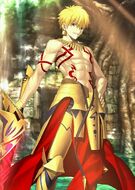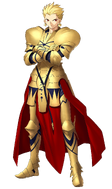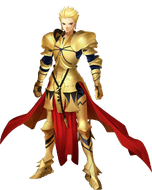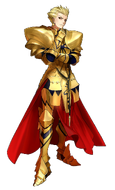| “ | To unite dreams beneath a banner of conquest. I praise your efforts. But, warriors... did you not understand? That all dreams must disappear when the dreamer wakes. Every last one of them. Therefore, it was inevitable that I would stand in your way. King of Conquerors, know the end of your eternal dream. I, myself, shall show you harsh reality. | „ |
| ~ Gilgamesh to Iskandar |
Summary
Gilgamesh (ギルガメッシュ, Girugamesshu) is the Archer-class Servant of Tokiomi Tohsaka during the Fourth Holy Grail War. After Tokiomi's death, he forged a new contract with Kirei Kotomine that lasted until the Fifth Holy Grail War. He is the King of Heroes (英雄王, Eiyū-Ō), the hero of the oldest epic poem in human history, who possessed all things in the world. Two-thirds a god and one-third human, and born from the union of King Lugalbanda and the goddess Rimat-Ninsun, he was a despot that ruled over and protected Uruk from all things, eventually turning against the gods themselves.
While in his youth he was an earnest and kind boy, he grew highly arrogant as he matured, becoming a tyrant, and though Uruk's people suffered, the city prospered. He faced off against Enkidu outside the Temple of Uruk, and for the first time in his life, he was challenged. He emptied out his vault fighting against Enkidu, and when the battle eventually ended, the two of them had become great friends. They worked and adventured side by side for years, battling against monsters side by side and protecting Uruk. After the goddess Ishtar fell in love with him and he rejected her, the Bull of Heaven was unleashed on Uruk.
After the seven years of destruction caused by the beast, he and Enkidu bound it with the Chains of Heaven and defeated it. Enraged and humiliated, Ishtar begged for them both to be put to death, but only Enkidu was punished. He died, returning to nothing but mud, and a distraught Gilgamesh cursed the gods, swearing that he would never call another his friend. At that moment, seeing the only person to ever equal him die, Gilgamesh became obsessed with his own mortality, and set out to become immortal. He searched out the sage Ziusudra, an immortal who hailed from an era before the Great Flood that had wiped out most of humanity. He searched for decades, but only discovered that Ziusudra had joined the gods to become immortal, becoming half-plant in the process. But he told Gilgamesh of another method, a herb that would make him immortal without having to depend on the gods or giving up his humanity in such a way.
He found this herb, and while he bathed, he felt true satisfaction and happiness in his own actions and successes for the first time in his life. But the herb, carelessly set aside in Gilgamesh's impatience and vanity, was eaten by a snake, gaining the immortal property of shedding its skin. Gilgamesh, realizing his journey had all been pointless, laughed hysterically, and returned to Uruk, having accepted his mortality and limited lifespan. There, he ruled Uruk as a wise king until he finally passed.
Powers and Stats
Tier: At least 7-B, up to at least 7-A with the Gate of Babylon, High 7-A with Merodach. At least High 7-A with Enuma Elish, 5-B with full power Enuma Elish | 5-A, higher with Enuma Elish
Name: Archer, Gilgamesh, King of Heroes
Origin: Fate/stay night
Age: Unknown (Summoned in his prime as an adult, though he possesses all the experience that he did in life, and spent 10 years incarnated in the world)
Gender: Male
Classification: Archer-class Servant
Powers and Abilities: Superhuman Physical Characteristics, Flight (Possesses a Noble Phantasm that allows him to levitate off the ground and take flight faster than any modern magi), possesses the prototype forms of every Noble Phantasm and all other things created by human hands and can fire them from portals, supernatural luck in collecting and maintaining wealth, minor Mind Manipulation with Charisma, Electricity Manipulation with Auto-Defensors, Energy Projection with various Noble Phantasms, Forcefield Creation, Homing Attacks, Ice Manipulation, Invisibility with Ring of Invisibility, Regeneration, Immortality, and/or Magic Negation with various Noble Phantasms, Clairvoyance and Precognition with Sha Nagba Imuru (Allows him to instantly discern great truths, such as the identity of another Servant and their Noble Phantasms, can see the possibilities of parallel worlds, predicting the future and knowing exactly what to do), Soul Manipulation (All Servants can consume souls to replenish their magical energy), can create a dislocation in space-time that specializes in destroying "worlds" and shows the "Truth" of creation using Ea, Intangibility and Invisibility in spirit form (Lost once he became incarnated by the mud of the Grail), Immunity to conventional weapons, Resistance to Magic (Increased further by his armor, includes effects such as Petrification, Spatial Manipulation, and Mind Manipulation), possesses incredibly strong willpower (Not even All the World's Evil can corrupt his ego, and was in fact completely ineffective, allowing him to fight back even when consumed and digested by Sakura), Regeneration (Mid-Low; all Servants have regenerative capabilities), Resistance to Spatial Manipulation and Time Manipulation (Is unaffected by the space-time dislocation created through the use of Enuma Elish and was unhindered by the collapse of Iskandar's Reality Marble) | All previous abilities, along with Resistance to Matter Manipulation, Mind Manipulation, Soul Manipulation, Information Manipulation, Probability Manipulation, Time Manipulation, Reality Warping, Causality Manipulation, Life Manipulation, Death Manipulation, Fate Manipulation, Probability Manipulation, Power Nullification and Illusion Creation, Time Paradox Immunity (After obtaining the power of the Root of the Beginning, BB, who is able to manipulate space-time, causality, probability, information, gravity, life, death, minds, senses, powers, and souls through her usage of Potnia Theron, was unable to affect Gilgamesh due to being opposed by a power of equal potency)
Attack Potency: At least City level (Could parry a few blows from Saber and Shirou when he was using Noble Phantasms projected with Unlimited Blade Works), up to at least Mountain level with the Gate of Babylon (His highest-ranked treasures can easily kill Berserker), Large Mountain level with Merodach (Easily overpowered and shattered Caliburn, which killed Berserker seven times over and can showcase light on the level of Excalibur, albeit weaker). At least Large Mountain level with Enuma Elish (Destroyed Rider's Reality Marble and easily overpowered Excalibur), Planet level with full power Enuma Elish (Ea is an Anti-World Noble Phantasm, capable of destroying Gaia's Reality Marble and likely overpowering Akhilleus Kosmos, which embodies the World. When used in Fate/strange fake, it would have destroyed the World without Enkidu's intervention). Enuma Elish also ignores conventional durability (It shows the "Truth" of creation, functioning on the same principle as Slash Emperor, which can kill Ultimate Ones, the strongest beings of each planet in the Solar System). | Large Planet level (The strongest Heroic Spirit, far above the likes of BB, who had absolute authority over the Moon Cell, and defeated Kiara, who can grow bigger than an Earth-sized planet), higher with Enuma Elish.
Speed: Massively Hypersonic (Kept up with Saber, Lancer, and Berserker, comparable to his Prototype self and Enkidu, who is this fast. Piloted the Vimana, which easily outpaced a fighter jet elevated to the level of a Noble Phantasm by Lancelot's Knight of Owner. Fought against True Archer, whose arrows can bypass the lightning bolts fired by his Auto-Defensors in Fate/strange fake). | Massively FTL+ (Should be comparable to the other Servants in their Mythic Formal Wear, who traveled 1,500 lightyears in a short span of time).
Lifting Strength: Unknown
Striking Strength: At least City Class (Stabbed Rider with Ea, killing him), up to at least Mountain Class with Noble Phantasms from the Gate of Babylon, Large Mountain Class with Merodach | Large Planet Class (Damaged Kiara Sessyoin in close combat)
Durability: At least City level (Should be comparable to other Servants even unarmored), Mountain level with armor (Tanked multiple attacks from Saber and can take all three slashes from Tsubame Gaeshi) | Large Planet level (Can trade blows with Kiara and survive her Noble Phantasm).
Stamina: Very high. Can stay in the world without a Master for a week before being incarnated, fight against Sakura while being broken down into magical energy, and can survive having his arm cut off, being stabbed in the chest by Shirou, and then being shot in the head by Archer, dying only because he was absorbed into the singularity created by the Grail. Fought against Enkidu for several days straight, ultimately expending the entirety of the Gate of Babylon.
Range: Extended melee range, at least Hundreds of Meters with Gate of Babylon, Kilometers (Shattered Rider's Reality Marble) to Planetary with Enuma Elish (Can shatter Gaia's Reality Marble and destroy the World).
Standard Equipment: His armor, and everything within the Gate of Babylon.
Intelligence: Created to be the pinnacle of all humans, Gilgamesh is an exceptionally intelligent individual when he wants to be, easily seeing through lies and discerning any number of forms of magecraft with a glance, predicting the number of weapons Shirou would project at once and countering him with an equal number of weapons from his treasury, instantly seeing through Caster's faked death, and backing away from Saber after she formed a contract with Rin. In addition, Sha Nagba Imuru allows him to see all possible outcomes, allowing him to always make the correct move and discern the True Names and Noble Phantasms of his opponent if he wishes. However, this intelligence is held back by his incredible arrogance, as he refuses to go all out against most opponents due to believing himself to be far above them, actively restraining the use of Sha Nagba Imuru, and only releasing more than a few Noble Phantasms at a time when he's feeling playful or irritated. In addition, due to his position as a king rather than a warrior, he has only mastered a handful of the Noble Phantasms stored in his treasury, preventing him from unleashing their effects most of the time.
Weaknesses: Gilgamesh is insufferably arrogant and will thus almost always hold back unless he sees his opponent as entertaining or worthy of his power. He barely knows how to wield most of the weapons in the Gate of Babylon. After being "blackened" by the mud of the Grail, he physically incarnated and lost he ability to enter spirit form. His arrogance makes him unlikely to use Enuma Elish at its full power, unless facing a worthy opponent.
Notable Attacks / Techniques:
Noble Phantasms
Gate of Babylon: King's Treasure: Gilgamesh's great treasury. It is a storehouse that contains the countless treasures of the world collected by Gilgamesh, and by using Key of the King's Law, Bab-ilu, he can open an invisible door to its contents to summon them whenever he pleases. It contains countless Noble Phantasm, including their prototypes, and he generally fires them from the vault as projectiles, though he can also summon them directly into his hand. This is why he is summoned into the Archer-class. It has an incredibly efficient cost, needed only to open the gates to begin with. He can prepare and produce hundreds or even thousands of Noble Phantasm at once if he wishes, and can return them to the vault whenever he pleases, even mid-flight.
The Gate of Babylon contains all the treasures in the world, with only Divine Constructs escaping his possession. This is no hyperbole; it contains the bases for all things constructed by humans throughout human history, from the works of the Library of Alexandria, to board games, to airplanes and submarines. The only technology he lacks are things that would be created by humans with entirely new concepts, and the technology of extraterrestrial races. As the original hero, all Noble Phantasms are descended from their prototypes in his collection. If a Servant would appear with a Noble Phantasm that he does not own or have an equivalent of without proper reason (such as it being a Divine Construct), he would gain it retroactively. In terms of Noble Phantasms, only attributes and techniques such as God Hand and Divine Constructs such as Excalibur or Vasavi Shakti elude him.
Notable items within the Gate of Babylon include:
- Anti-Spirit Incense: An ash-like powder that attracts walking corpses like those summoned by Angra Mainyu.
- Auto-Defensors: A series of golden discs that float around Gilgamesh and can defend an area as large as a single floor building, they defend Gilgamesh from virtually any projectile by shooting them down with innumerable lightning bolts as they approach. It provides sufficient protection against even a storm of surprise attacks from Enkidu. However, a sufficiently fast projectile, such as True Archer's arrows, would be able to bypass them completely.
- Caladbolg: The prized spiral sword wielded by Fergus mac Róich, it is able to generate powerful beams of iridescent light that can cleanly slice through hills and devastate a fortress if planted in the ground.
- Command Spells: In Fate/Extra CCC, Gilgamesh has collected several Command Spells that would normally be used to bind Servants like himself and can provide them to a new Master if he wishes to establish a contract with them.
- Curtain of Night: A magical item mentioned in passing as a means of counteracting Gawain's Numeral of the Saint, possibly by blotting out the sun.
- Dáinsleif: A demonic sword from the Nibelungen. It is a cursed Noble Phantasm that contains a powerful curse of "reparation" to be used on its target, and it also drives the fate of its possessor to ruin and causes them to surely die. Within the Skáldskaparmál, it is possessed by the Danish king, Hogni. He became locked in eternal combat with the king of Serkland, Hedinn, due to the sword's curse, which requires it to always kill a man once drawn and does not allow it to return to its sheath until such is accomplished.
- Durandal: The Peerless Sword: Originally the sword of Hector, he converted it into the spear Durindana, and after it later lost its features as a spear, it became Durandal. It was then later said to have been granted to King Charlemagne of the Frankish Empire by an angel and awarded to Roland. It is noted as the symbol of the Battle of Roncevaux Pass told of in the Song of Roland. Although Roland attempted to break the sword when he was on the verge of death to keep it from falling into the hands of the enemy, it proved to be impossible, but it was later prominently featured in Charlemagne's legends, acting as a symbol of Roland's bravery. The sword is a splendidly forged "symbol of power" much like King Arthur's Caliburn, and it is said to hold three miracles within it. It will not lose its sharpness even should its user's magical energy be depleted, proving indestructible even when Roland tried to destroy it.
- Gáe Bolg: The spear of Cú Chulainn, a massive two-meter long weapon with the ability to always strike the opponent's heart. However, Gilgamesh lacks the knowledge required to activate this ability, but can still fire it as a powerful projectile that inflicts wounds that cannot be healed with natural regeneration.
- Golden Axe: A weapon seen in Fate/Extra CCC, it is one of the few weapons Gilgamesh wields personally, cleaving targets along with the space around them with a spinning shop.
- Golden Drill: Another weapon seen in Fate/Extra CCC and one that Gilgamesh wields personally, penetrating and tearing apart targets with its drilling motions along with cannon and machine gun fire.
- Gram: The "Sword of the Sun" wielded by Sigurd in the Völsunga saga of Norse mythology. It is said to be the "strongest demonic sword" that equals the "strongest holy sword", so it possesses the special characteristic of "dragon slayer". The weapon is said to appear in the Der Ring des Nibelungen under the name change of Balmung.
- Houtengeki: A halberd passed down in Chinese culture and the only type of halberd out of many to attain the rank of Noble Phantasm, probably due to the use of Houtengageki by a famous military commander. It is a polearm with many different uses such as thrusting, swiping, pulling, parrying, and various others. Chinese halberds have a spearhead at the tip of the shaft and a blade attached to the side, and the distinguishing characteristic of a Houtengeki is a unique crescent-moon shaped side blade, the “Moon Fang.” Weapons with only one of these blades are called Seiryugeki. It is said that a great deal of skill is needed to handle this weapon, though its versatility and ease of use once mastering it allowed for it to be used to serve the appropriate role for any type of combatant.
- Immortal Slaying Scythe, Harpe: The Snake Hunter's Scythe, a divine sword from Greek mythology used by Perseus to kill the Gorgon Medusa and one of the many weapons inside Gilgamesh's Gate of Babylon. It is described as a monster-killing holy sword with a special shape similar to a scythe, having the cutting edge on the inside of the blade, though it isn't actually an outstanding sword by itself. Its true strength is its trait of Refraction of Longevity, which is a divine ability that nullifies the "undying attribute" of immortals and inflicts wounds that cannot be restored by any methods other than healing in accordance to the natural laws.
- Merodach: The Original Sin: The prototype of both Gram and Caliburn, and due to its greater mystery it outstrips them in every aspect. It is named after Marduk, the patron god of Babylon. Its strength as a Noble Phantasm is incomparable, easily shattering Caliburn without it being able to put up any resistance. It utilizes the same power as Caliburn, a "light that can burn away everything it touches", that could kill Berserker with one slash.
- Mountain-Piercing Spears: A series of unnamed spears that can easily pierce mountains.
- Potion of Youth: A Noble Phantasm that returns the user to their youth, contained within a small translucent bottle. It is the herb of immortality, that which Gilgamesh sought and found after the death of his closest friend, Enkidu. While he lost it and came to terms with his own mortality, he still sought and found it again for the sake of having it in his treasury. When he drinks it, it returns him to his child self, altering his personality and appearance. He only uses it to blend into the world and tolerate modern society, such as within the ten year gap between the Fourth and Fifth Holy Grail Wars, or when he sees something as a childish game that isn't worthy of his full strength. He can forcibly reverse the effects whenever he pleases to return to his older self.
- Rho Aias: The Seven Rings that Cover the Fiery Heavens: The shield used by Aias the Great to stop Durindana, the spear of the Trojan hero Hector, tearing through six of its seven layers of cowhide but stopping at the final layer. As a result, it has been sublimed as a virtually absolute Conceptual Defense against thrown and launched weaponry.
- Ship of Light: A vehicle that allows Gilgamesh to travel faster than the speed of light. It allows him to instantly return after he is sent to the edge of the Moon Cell's Imaginary Space hundreds of light-years away.
- Vajra: A weapon appearing in the Vedic mythology of ancient India. It was a weapon crafted by Tvastar, the maker of divine instruments, using the bones of the sage, Dadhichi. It became symbol of divinity of Indra, the god of lightning, and the indestructible diamond pounder (金剛杵, kongōsho) weapon carried by the gods of Buddhism. It was held in one interpretation to be a manifestation of Indra’s lightning, which is supported by its deceptions as a golden projectile and its appearance unbefitting of a conventional weapon. Vajra was initially known by its proper name of Vjaya when Indra was first introduced to India as a phenomenon that spread from the Aryans. Along with Indra, whose name changed to Taishakuten, his divine symbol also had its name changed and became known as Vajra after the age of Buddhism as India's main religion began. It is a simple weapon that can only be shot only once for a fixed B+ rank damage separate from the user's magical energy supply.
- Unnamed Anti-Magic Sickle: An enormous sickle that drains magical energy and can cut through magical implements such as Saber's armor or Berserker's Knight of Owner.
- Unnamed Dimensional Refraction Artifact: An artifact that defends against attacks that use the Multi-Dimensional Refraction Phenomenon, allowing Gilgamesh to block attacks that come from parallel universes such as Sasaki Kojirou's Tsubame Gaeshi.
- Unnamed Draining Scythe: A scythe that does not deal physical damage, passing through the target's armor and body and draining away their magical energy.
- Unnamed Dragon-Slaying Longsword: Gilgamesh also possesses a longsword that slayed an oriental dragon in the past.
- Unnamed Freezing Sword: Gilgamesh possesses a sword that would freeze any target struck as well as the area around them, covering the target in ice even if they managed to dodge the initial strike for as long as they're within relative proximity of the blade.
- Unnamed Invisibility Ring: A ring that wards off the attention of normal people, preventing them from noticing him. It doesn't work on magi or other magical beings.
- Unnamed Invisible Sword: A sword that is described as "invisible like Saber's" that Gilgamesh fires as a projectile.
- Unnamed Lens: A golden ring with a single, warped lens that allowed Gilgamesh to view True Archer from twenty kilometers away.
- Unnamed Levitation Treasure: An unnamed treasure that allows Gilgamesh to levitate in mid-air.
- Unnamed Lightning Noble Phantasm: Gilgamesh is able to launch "lightning without form" as a projectile without the use of his Vajra Noble Phantasm.
- Unnamed Magical Staves: Various magical rods and staves that can use magecraft from the Age of Gods. Those seen have generated pillars of flame, concentrated lightning storms, and light beams that home in on their targets.
- Unnamed Mirror Shield: A shield that effortlessly repels powerful magecraft.
- Unnamed Spellbook: An unnamed tome that allows Gilgamesh to utilize powerful Primeval Runes from the Age of Gods.
- Unnamed Triple-Edged Sword: A sword with three edges that can arc behind an opponent to attack their back if left unguarded.
- Various Unnamed Homing Weapons: Gilgamesh possesses multiple weapons, such as scythes, scimitars, and axes that are able to constantly follow their chosen target even if they dodge in a vehicle as maneuverable as a modern fighter jet empowered by Lancelot's Knight of Owner.
Vimana: Throne of the Heaven-soaring King: A flying contraption passed from Babylon and India that appeared within the Ramayana and Mahabharata, and one of the many Noble Phantasms within the Gate of Babylon. It far surpasses any jet from the modern era, fueled by crystals that burn mercury as fuel. Even when Gilgamesh was just fooling around, he easily outpaced Lancelot in a fighter jet elevated to a Noble Phantasm by Knight of Owner. He uses the Gate of Babylon freely while piloting Vimana, firing projectiles, and it is also apparently equipped with ancient machine guns. It has many other functions that he did not use, including stealth functions, communication interception technology, laser cannons, and biological weapons, among others.
Enkidu: Chains of Heaven: Gilgamesh's most trusted Noble Phantasm, even more so than Ea. It is a set of chains named after his closest friend, and made to bind even the gods themselves. It is one of the few Anti-Divine Noble Phantasms, growing stronger when used against those with divine blood, such as Heracles, becoming more effective the higher their rank of Divinity. Against a non-divine Servant, it is nothing but a strong chain. Those that are caught in it cannot escape even through the use of a Command Seal, though Berserker, in his last moments, in a desperate show of his own strength, is able to shatter the chain and escape. Gilgamesh can summon Enkidu from anywhere he can reach with the Gate of Babylon, and draws out its full length when serious to use it in conjunction with Ea.
Sword of Rupture, Ea: The ultimate Noble Phantasm of the Gate of Babylon and Gilgamesh's most powerful weapon. Unlike the countless other Noble Phantasm within his treasury, which were passed onto countless wielders after his death and took on many forms, it is a sword only he possesses. It is a Divine Construct that predates the concept of a sword, bearing a truly unusual design, a cylindrical "blade" with a dull tip and independently rotating segments. It signifies the universe, in all its parts, and was created by the Gods to cultivate worlds - it was used in the creation of the World itself, before ultimately ending up in Gilgamesh's hands. As his most powerful treasure, Gilgamesh is reluctant to use it against "lowlifes", willingly drawing it only to face those he believes are worthy, such as Alexander the Great and King Arthur.
- Enuma Elish: The Star of Creation that Split Heaven and Earth: Ea's function as a Noble Phantasm, its maximum output as an EX-ranked Anti-World Noble Phantasm. The separate sections of Ea rotate faster and faster, working to create a dislocation in space-time that destroys everything in Gilgamesh's sight at once, ripping open the World to reveal the "Truth". It is similar in this way to Slash Emperor, a Knight Arm capable of destroying Type Jupiter in a single blow. As an Anti-World Noble Phantasm, it is well-suited to the destruction of Reality Marbles, in a manner that Gilgamesh describes as revealing the reality behind a dream, and when used in Fate/strange fake, it began to destroy the planet itself. When used in Fate/Extra CCC, he plants it in the ground, allowing it to charge, spinning rapidly and destroying the ground around him. It creates a great space-time dislocation, which Gilgamesh crushes his opponent with. However, most of the time, Gilgamesh does not use its full power, as it is hardly necessary; even a casual Enuma Elish easily overpowered Excalibur and gravely wounded Saber, rendering her helpless.
Sha Nagba Imuru (He who Saw the Deep): The Omniscient Omnipotent Star: Gilgamesh's mentality and intelligence, sublimated into a Noble Phantasm. It is continuously active and does not need its true name revealed to use it, though Gilgamesh keeps it restricted most of the time. It grants him high-level Clairvoyance, allowing him to discern great truths with a glance, identifying Servants and their Noble Phantasm with ease. It does not just show him advanced predictions and possibilities, but allows him to look down over all the possibilities and discern the correct move to make. Even when he uses this ability to its fullest extent, his arrogance leads him to reject certain world lines as impossible, including one in which he was consumed by the mud of the Grail and broken down into magical energy.
Class Skills
Independent Action: The ability to remain independent and exist in the world without the magical energy supplied by a Master, allowing the Servant to act autonomously and the Master to save their own magical energy for spells. Under normal circumstances, Gilgamesh's rank of A allows him to act without a Master except when it comes to the use of high-cost Noble Phantasms, and he can remain in the world for a week without a Master. After he was incarnated by the mud of the Grail, he needs no Master to act and use high-cost abilities. Through this, he remained materialized even after the Fourth Holy Grail War ended.
Magic Resistance: An ability that grants protection against magical effects. Unlike the Resistance effect that merely rejects Magical Energy, this ability cancels the spells altogether. Gilgamesh's proficiency in this skill ranges from E to C-Rank depending on who summoned him, with E-Rank merely reducing the amount of damage he takes from magical attacks and C-Rank nullifying spells below two verses. It is, however, further enhanced by his armor, raising it above the magic resistance of even King Arthur, who can negate magecraft from the Age of Gods. He has many other possessions that would also allow him to negate magecraft. This ability also provides resistance against indirect magical attacks such as Petrification, Hypnosis, and Spatial Manipulation.
Personal Skills
Charisma: The natural talent to command an army, which increases the ability of allies during group battles. In Gilgamesh's case it is no longer popularity, but rather a kind of curse in itself due to his A+ Rank proficiency, causing normal humans to prostrate themselves at his feet in his mere presence. It can also be used as a form of subtle Mind Manipulation, getting people to do what he wants without much resistance.
Collector: A "talent" in collecting high quality goods, a sort of supernatural luck that draws rare items into Gilgamesh's hands. Gilgamesh is one who has collected all the Earth's treasures, grasping the very essence of human ingenuity itself.
Divinity: The measure of one's Divine blood, reflected in high ranks by the user becoming part Divine Spirit, though it decreases if the user dislikes the gods. It allows Gilgamesh to reduce "purge defense" in proportion to the rank of his Divinity, allowing him to break through defensive abilities such as Achilles' Andreas Amarantos. Gilgamesh would normally have an A+ Rank in this skill due to being two-thirds divine, but his effective rank has dropped to B due to his distaste for the gods.
Golden Rule: Throughout history and mythology, individuals destined to amass vast fortunes and treasure are identified as possessing Golden Rule. Among these figures, Gilgamesh stands alone at the zenith of opulence, for he has at his disposal enough riches to purchase whatever he may need in any era of summoning, as evidenced by his A-Rank in this skill.
Key: Base | Genesis Mythology Mystic Code / Original Power
Gallery
Others
Notable Victories:
Sinbad (Magi) Sinbad's Profile (Note: Speed was equalized and this was Fate/stay night Gilgamesh)
Ragyō Kiryūin (Kill la Kill) Ragyō's Profile (Speed was equalized, both were bloodlusted and High 7-A versions were used)
666:Satan (The God of High School) 666:Satan's Profile (This was Gilgamesh in his original form as a Heroic Spirit and Phase 1 Satan. Speed was equalized and both were bloodlusted)
Hakumen (Blazblue) Hakumen's Profile (Speed was equalized and 5-A versions were used)
Ainz Ooal Gown (Overlord) Ainz Ooal Gown's Profile (Speed was equalized and Fate/Stay night Gil was used)
Arcueid Brunestud (Tsukihime) Arcueid Brunestud's Profile (Pre-Tsukihime and Fate SN/Zero Gil was used)
Sosuke Aizen (Bleach) Aizen's Profile (Note: This was Base Aizen and Fate/Stay Night Gilgamesh restricted to his 7-B weapons. Speed was equalized)
Ren Fuji (Masadaverse) Ren Fuji's Profile (Fate SN/Zero Gil and Base Ren was used. Speed equalized)
Notable Losses:
Novel Kars (JoJo's Bizarre Adventure) Kars' Profile (Speed was equalized)
Robloxian (Roblox) Robloxian's Profile (Speed was equalized and 7-B forms were used)
Yukari Yakumo (Touhou Project) Yukari Yakumo's Profile
Homura Akemi (Puella Magi Madoka Magica) Homura's Profile (This was Fate SN/Zero Gilgamesh and Homulily Stage 2 Homura. Gil was bloodlused while Homura was in character and speed was equalized.)
Inconclusive Matches:
Road Kamelot (D.Gray-Man) Road's Profile (Speed was Equalized, 7-B Gilgamesh was used)
Gilgamesh (Final Fantasy) (Final Fantasy) Gilgamesh's Profile (Speed was Equalized, 5-A versions were used)




























